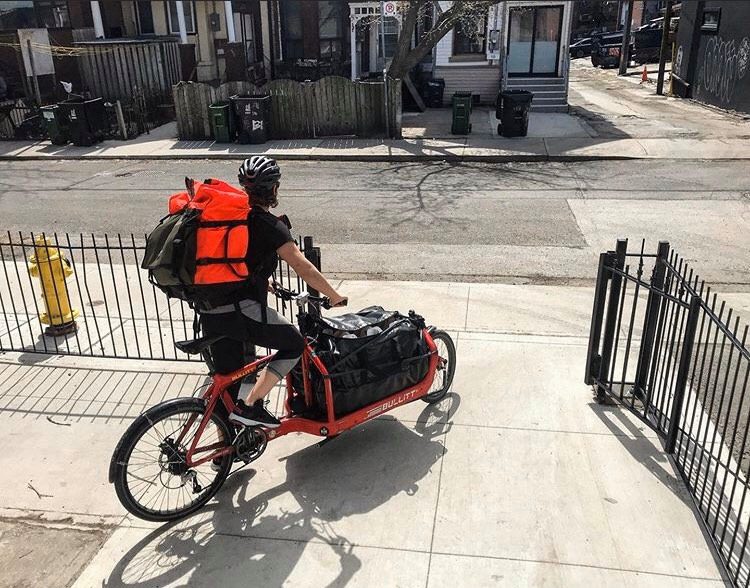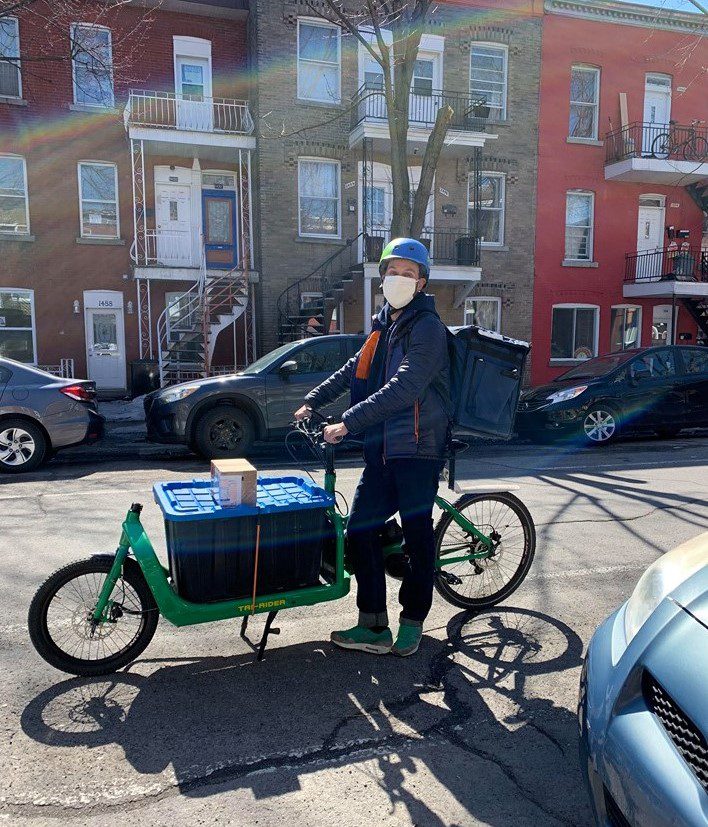How bike courier services are helping small businesses and adapting to a rapidly changing reality
Companies navigate new operational considerations and increased demand for local delivery

Kat Exner, a rider and partner at Send It Courier in Toronto, is exhausted.
“This work feels important,” she says. “I mean, we always think it’s important, but right now it also feels kind of scary.”
Opening doors, pressing buttons, interacting with clients—the job requires an unwavering awareness for the potential of infection and spread. Being constantly alert is mentally exhausting, particularly when working a physically demanding job.
A quiet office
The Send It office, once buzzing with people, conversation and chain grease, is now virtually empty and completely sterile. “Every surface is constantly disinfected, you could eat off the floor it’s so clean,” says Exner. To maintain social distancing, a maximum of three employees occupy the office at a time. Exner says it’s taken a toll on the overall camaraderie of the tightly knit group.
Changed deliveries
Lunchtime corporate catering was a big part of every-day deliveries and one of the most profitable parts of Send It’s business. With most offices closed, large food delivery orders have all but completely dropped off, along with medical, dental and legal paperwork deliveries, another major sector of the business.
While many clients have ceased operations, some businesses are unexpectedly flourishing.
“We have seen segments of our business that have always had a presence skyrocket during the crisis,” says Exner.
Floral deliveries have increased by 500 per cent. “People want to reach out to loved ones in a touching way,” she says. “It’s a way to physically connect with each other.”
Prescription drop offs have also surged. Exner says she’s had entire shifts where she delivered only medication.
Various other tasks, such as shuttling computer equipment place to place, taking orders from a few independent grocers and delivering exercise equipment (“that’s an interesting one,” says Exner) have helped to make up the shortfall, but it might not be enough.
“When we come out of this what will be left standing?” Asks Exner, considering the future of the business. “…we don’t even know if we’re gonna come out of it.”
Send It’s staff has been severely reduced—many part time workers had to drop hours to apply for CERB. With just a handful of employees filling shifts, Exner says the company has been struggling to find time to reach out to potential new clients, though they are happily taking work.
In Montreal, a different situation
A few weeks ago Joffrey Fuzet, owner of Livraison Vélo Montreal (LVM) delivery in Montreal, was forced to lay off some employees due to slow business. Now, the company is actively hiring.
LVM had been working with some cafes and restaurants at the beginning of the shutdown, but they were getting hardly any orders.
At the end of march, LVM decided to take part in a pilot initiative, which would allow local businesses to have their products delivered even if they didn’t have a website or delivery system. The project is overseen by the City of Montreal, Montreal Commercial Development Companies (SDC), Co-op Carbone and Jalon Montreal. It includes expected businesses, such as grocers, but also connects other merchants like bookstores, board game stores and soap stores, with delivery services
“In one week everything changed,” said Fuzet. “Every day we’re getting record numbers of orders.”

As the wait period for Canada Post delays continues to grow, customers are looking at local options. Fuzet says that once the public was aware that they could receive deliveries within 24 hours, orders—which previously hovered around 10-20 per day—increased to more than 150 daily.
Environmentally and commercially sustainable
Despite the positives, Fuzet is cautious about the sudden business increase. “I’m working with a group of delivery companies to propose a more permanent, integrated model of the current system,” he says. As of now Montreal businesses are slated to re-open on May 1, so they hope to have it ready for the end of the month.
Fuzet also points out the environmental benefits of the program, citing the worldwide reduction in air pollution and cycling as a sustainable means of safe transit. “We have the momentum right now,” he says. “We have to make it count, we have to make something of it.”
Connections not made
As of now, the city of Toronto and most major Canadian cities have not taken any steps to connect local businesses and courier operations. Companies like Send It and local businesses are left to navigate this completely new delivery landscape on their own.
